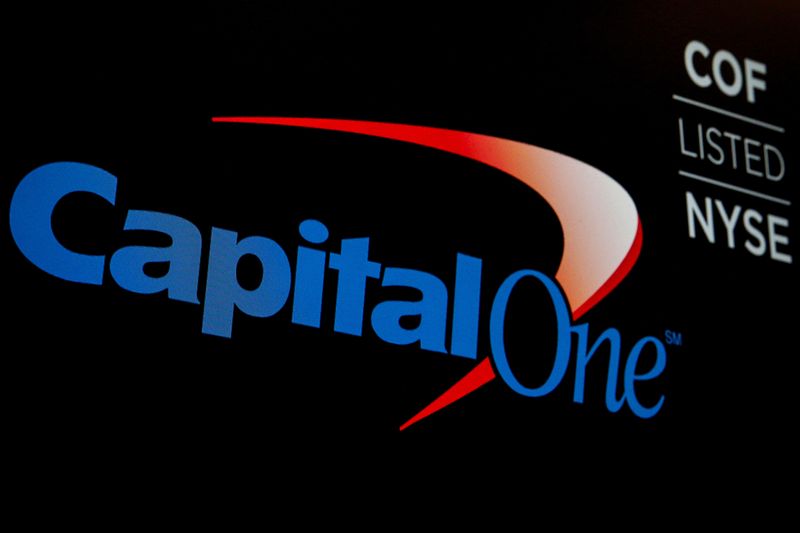
©Reuters. The Capital One logo and ticker are displayed on a screen on the floor of the New York Stock Exchange (NYSE) in New York, U.S., May 21, 2018. REUTERS/Brendan McDermid/File Photo
By Anirban Sen and Michelle Price
NEW YORK/WASHINGTON (Reuters) – Capital One, a U.S. consumer bank backed by Warren Buffett, is in advanced talks to buy credit card issuer Discover Financial Services (NYSE:), with an announcement possible as early as Tuesday, according to sources familiar with the market. the question said.
While the exact size of the deal, which would combine two of the largest U.S. credit card companies, was not immediately clear, it has the potential to be the largest U.S. banking deal since Merrill’s $50 billion acquisition Lynch by Bank of America in 2009. .
Capital One is valued at $52.2 billion, LSEG data shows, and is the fourth-largest player in the U.S. credit card market by volume as of 2022, according to Nilson. Discover has a market capitalization of $27.6 billion and is the sixth largest credit card operator in the United States.
The banks did not immediately respond to requests for comment. Bloomberg News first reported the deal talks.
The deal is likely to come under intense scrutiny as Democratic President Joe Biden’s administration continues to focus on promoting competition across all sectors of the economy, including a 2021 executive order targeting banking deals.
“I anticipate that this deal, if it comes to fruition, will provoke a significant backlash and receive increased regulatory scrutiny,” wrote Jeremy Kress, a University of Michigan business law professor who previously worked on bank merger oversight at the Federal Reserve . an email to Reuters.
“It will be the first major test of bank merger regulation since the Biden administration’s executive order on promoting competition in 2021.”
Progressive Democrats have long fought bank consolidation, arguing that it increases systemic risk and harms consumers by reducing lending, and have stepped up pressure on regulators to take a tougher stance on the deals. The pressure intensified following deals to rescue failed lenders last year, including the purchase of JPMorgan Bank of the First Republic (OTC:).
The Biden administration’s executive order required banking regulators and the Department of Justice to review their bank merger policies. The Justice Department later said it will consider a broader range of factors when evaluating bank mergers for antitrust issues, while the Office of the Comptroller of the Currency last month proposed eliminating its expedited review process.
In terms of assets, Discover was the 27th largest U.S. bank with nearly $150 billion in assets, according to December Federal Reserve data ranking insured U.S. banks, while Capital One was ninth with $476 billion in assets. assets. The combined entity would be the sixth-largest U.S. bank, Fed data show.
Although the pair overlaps in some areas of the credit card business, Discover is one of the four major U.S. credit card processors, along with Visa (NYSE:), Mastercard (NYSE:), and American Express (NYSE:)
The deal would also come at a time of increased regulatory focus on credit card fees, which are the subject of tough new rules proposed by the Consumer Financial Protection Bureau.
The agency, led by merger skeptic Rohit Chopra, who has a say in banking operations, last week flagged competition problems in the U.S. credit card market. In one report, it notes that during the first half of 2023, small banks and credit unions tended to offer cheaper interest rates than the 25 largest credit card companies across all credit score levels.
A previous CFPB report also found that the top 10 issuers by average credit card stock accounted for 83% of credit card loans in 2022, continuing to decline from 87% in 2016.
SUPERVISORY ISSUES
In late 2023, Discover said it was exploring the sale of its student loan business and would stop accepting new student loan applications in February.
The company, led by TD Bank group veteran Michael Rhodes, has faced some regulatory challenges. A regulatory review into some misclassified credit card accounts from mid-2007 was made public in July.
In October, Discover said it agreed to improve its consumer compliance and related corporate governance as part of a consent order with the Federal Deposit Insurance Corp.
While oversight issues are generally a hurdle for deals between financial firms, legal experts say regulators are more accommodating when the issues involve the target company and the acquirer is considered a good actor.
Discover and Capital One reported declines of 62% and 43%, respectively, in fourth-quarter earnings, as banks increased provisions for bad-debt losses while rising interest rates increased the risk of borrower defaults. consumers on credit card debt and mortgages.